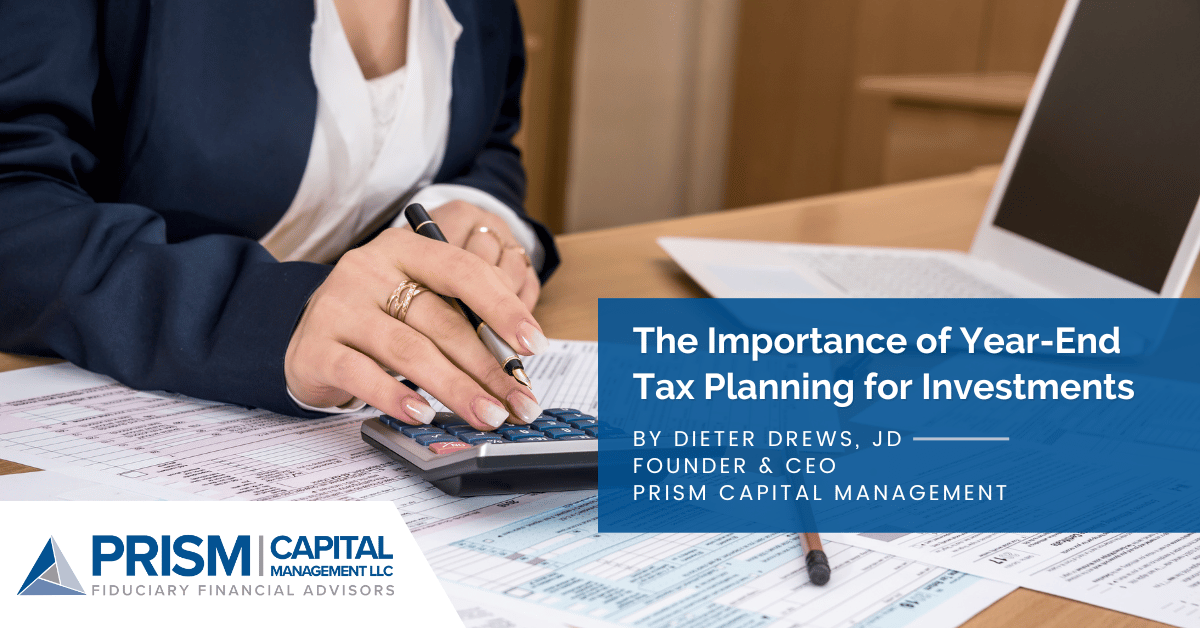The Importance of Year-End Tax Planning for Investments
As the year draws to a close, tax planning becomes essential, especially when it comes to investments. For investors, proactive tax strategies can make a significant difference in overall financial health. Effective year-end tax planning ensures investors retain more of their returns, reduce their taxable income, and strategically position their portfolios for the upcoming year. Here’s why year-end tax planning matters and how investors can benefit from it.
Why Year-End Tax Planning Matters
Minimizing Tax Liabilities
Effective year-end tax planning allows investors to assess their financial standing and identify ways to reduce their taxable income. By reviewing portfolios, investors can take advantage of strategies such as tax-loss harvesting, which involves selling underperforming assets to offset gains from winning investments. This strategy can reduce capital gains taxes, effectively lowering the amount of tax due.
Strategic Investment Decisions
The end of the year is an excellent time to analyze and reallocate portfolios to align with financial goals and risk tolerance. Through tax planning, investors can also determine if they should hold or sell specific investments based on their tax implications, taking advantage of lower tax rates on qualified dividends and long-term capital gains.
Maximizing Retirement Contributions and Benefits
Contributions to retirement accounts like IRAs and 401(k)s can often reduce taxable income, offering a direct financial benefit. By maximizing contributions before year-end, investors not only take advantage of tax-deferred growth but also reduce their immediate tax obligations. Additionally, those over 50 can contribute extra to retirement accounts with “catch-up” contributions, further enhancing tax-saving opportunities.
Planning for Required Minimum Distributions (RMDs)
For investors who are 73 or older, required minimum distributions from retirement accounts must be taken by December 31 each year. Failure to do so incurs substantial penalties, which can significantly impact retirement savings. Planning for RMDs ensures that investors avoid penalties and meet distribution requirements without a last-minute rush.
Adjusting for Tax Code Changes
Tax laws can change yearly, influencing investment decisions. Year-end is the perfect time to consult with a tax advisor to stay updated on relevant tax law changes. Understanding these adjustments helps investors maximize benefits and avoid any potential pitfalls.
Year-End Tax Planning Strategies for Investors
1. Tax-Loss Harvesting: Tax-loss harvesting involves selling securities that have decreased in value to offset capital gains. This strategy can lower the taxable income and reduce the investor’s overall tax liability. Remember that losses in excess of gains can offset up to $3,000 of ordinary income per year, with any remaining losses carried forward to future years.
2. Review Asset Allocation: Year-end tax planning is also a good opportunity to review and adjust asset allocation. By strategically balancing assets between tax-advantaged and taxable accounts, investors can minimize taxes on dividends, interest, and capital gains.
3. Consider Charitable Giving: If investors plan to make charitable contributions, year-end is an optimal time. Contributions to qualified charities can provide a deduction, which lowers taxable income and supports important causes. Donor-advised funds also allow for flexible, tax-efficient giving that can be disbursed over time.
4. Maximize Retirement Contributions: Making the most of retirement account contributions reduces taxable income and bolsters retirement savings. Contributions to traditional IRAs, 401(k)s, and other retirement plans are generally tax-deferred, creating long-term tax-saving benefits.
5. Address Capital Gains Distributions: Many mutual funds and ETFs issue capital gains distributions near the end of the year. Investors should assess their portfolios and consider potential tax consequences of these distributions. Sometimes, delaying a purchase until after a distribution date can avoid an unnecessary tax hit.
Working with a Financial Planner
Effective tax planning is complex and requires a thorough understanding of tax codes and regulations. Working with a financial planner or tax advisor ensures that investors make informed decisions aligned with both short-term and long-term goals. At Prism Capital Management, we work closely with clients to develop personalized year-end tax strategies, helping them manage their investments effectively and optimize tax savings.
The Bottom Line
End-of-year tax planning is a valuable practice that helps investors maximize returns, minimize tax liabilities, and strategically position their portfolios for the year ahead. By taking advantage of tax-loss harvesting, retirement contributions, charitable giving, and other strategies, investors can retain more of their wealth and avoid unexpected tax consequences.
Financial Services for Real People
Founded for the benefit of clients, Prism Capital Management is an independent Seattle and Skagit-based firm with a deep commitment to providing guidance that is free of conflicts of interest, based solely on the sum of our experience and expertise. We are committed to putting client interests first and to stewarding both wealth and well-being for those we serve. We have a singular measure of success: the results we get for our clients.
As an Investment Advisor, we have a fiduciary duty to act in YOUR best interest. From planning to investment management to advice on buying a car, we are your financial life partners.




